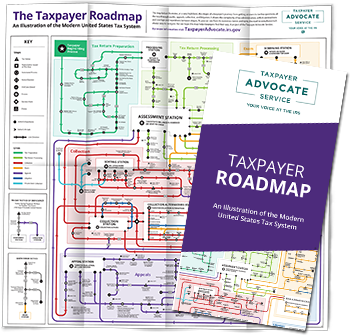Appeals Agrees With Taxpayer
Form 12256
View our interactive tax map to see where you are in the tax process. It could help you navigate your way through the IRS.
(Note: This letter appears in multiple locations within the Taxpayer Roadmap.)
View our interactive tax map to see where you are in the tax process. It could help you navigate your way through the IRS.
(Note: This letter appears in multiple locations within the Taxpayer Roadmap.)

This is the form you submit if you would like to withdraw your request for a Collection Due Process (CDP) or Equivalent Hearing (EH).
This notice or letter may include additional topics that have not yet been covered here. Please check back frequently for updates.
You would submit this form if you have reached a resolution or agreement with the IRS regarding the tax periods on the CDP/EH hearing request or you are satisfied that you no longer need a hearing with the IRS Independent Office of Appeals (Appeals). By submitting this form, you withdraw your hearing for lien, levy, or both.
By withdrawing a CDP hearing request, Appeals will not verify that all legal and administrative requirements were met for the periods listed on the original request for a hearing. You will also give up your right to judicial review by the U.S. Tax Court. When the CDP hearing request is withdrawn, levy action is no longer suspended and the Collection Statute Expiration Date (CSED) is no longer suspended.
If you withdraw your request for a CDP hearing or EH, the IRS will not make a decision on your hearing request; however, you will not give up any other appeal rights that you may be entitled to, such as an appeal under the Collection Appeals Program (CAP).
You have a balance owed on your tax account. The IRS has either issued you a notice of intent to levy with appeal rights or filed a Notice of Federal Tax Lien (NFTL). You have exercised your appeal rights and either made a timely request for a CDP hearing or your request for a CDP hearing was made after the due date for a timely hearing and you were entitled to an EH within the one-year period with Appeals.
If you have questions, you can contact the person shown at the top of the letter.
If you agreed to a collection alternative such as an installment agreement or an offer in compromise, you’ll need to make payments based on your agreement with the IRS. You’ll also need to stay current with your tax obligations – filing your tax returns and paying your taxes timely during the time of the agreement, and if you entered into an offer in compromise, for five years after the IRS accepts your offer.
When your case is returned to the IRS Collection function, you may want to review information regarding enforcement actions:
You can also review information regarding collection alternatives and resolutions:
Understanding your notice or letter
For more specifics on your notice, visit Understanding your IRS Notice or Letter on IRS.gov
Get Help topics
Browse common tax issues and situations at TAS Get Help
If you think you’ll have trouble paying your taxes or the NFTL filing will cause economic hardship, it’s helpful to know what your options are to address your tax debt.
If you still need help
The Taxpayer Advocate Service is an independent organization within the IRS that helps taxpayers and protects taxpayers’ rights. We can offer you help if your tax problem is causing a financial difficulty, you’ve tried and been unable to resolve your issue with the IRS, or you believe an IRS system, process, or procedure just isn’t working as it should. If you qualify for our assistance, which is always free, we will do everything possible to help you.
Visit dev.taxpayeradvocate.irs.gov or call ![]() 1-877-777-4778.
1-877-777-4778.
Low Income Taxpayer Clinics (LITCs) are independent from the IRS and TAS. LITCs represent individuals whose income is below a certain level and who need to resolve tax problems with the IRS. LITCs can represent taxpayers in audits, appeals, and tax collection disputes before the IRS and in court. In addition, LITCs can provide information about taxpayer rights and responsibilities in different languages for individuals who speak English as a second language. Services are offered for free or a small fee. For more information or to find an LITC near you, see the LITC page on the TAS website or Publication 4134, Low Income Taxpayer Clinic List.
Appeals Agrees With Taxpayer
Form 12256, Withdrawal of Request for Collection Due Process or Equivalent Hearing